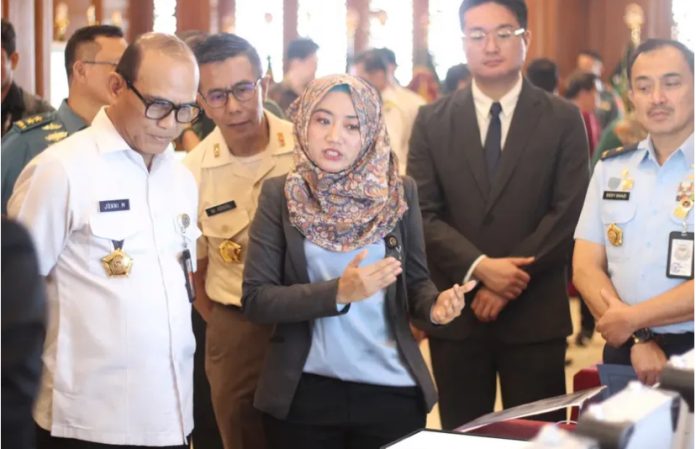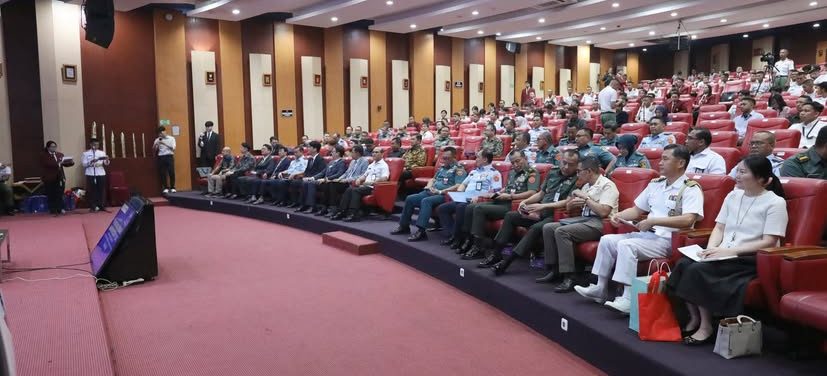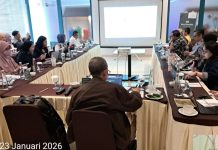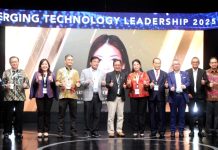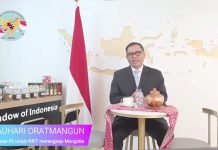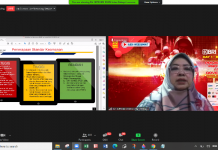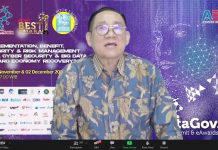Jakarta, Komite.id – The Indonesian Defense University inaugurated the Center for Quantum Security Ecosystem (CQSE), an initiative for the development of a national cyber defense system in response to accumulating threats of quantum computing technology.
Defense University Rector, Lieutenant General (ret.) Jonni Mahroza, emphasized the urgency of mastering quantum technology in order to maintain Indonesia’s digital sovereignty.
“Quantum-based cyber threats are not speculations of the future, but realities that need to be responded now,” Jonni said while addressing an international seminar themed “Quantum Security for National Cyber Defense” on Monday, May 5, 2025.
This event presented experts from South Korea and Indonesia who discussed the challenges of classical cryptography that is vulnerable to quantum algorithms such as Shor’s Algorithm.
Dr. Rudi Rusdiah, ABDI General Chairperson discussed with resource person Mr. Junghyun Baik CFO EYL Korea regarding the development of Quantum Computing (QC) in the world which is still not mature, because the error rate is still high at 1%-5%, so error correction is needed with many physical/logical Qubits and Stochastic outputs that need to be normalized, so QC is not ready to produce definite and exact output, such as utilizing High Performance Computing such as GPU. For example, the development of QC in the US, China which is a pioneer, followed by Europe, South Korea, Japan, Singapore, Malaysia & Taiwan, still estimates that QC will only be able to mature and produce exact output in about 5-10 years. That is why what is currently being pushed by Korea at the International Seminar on Quantum at the Defense University focuses more on the theory of Physical Quantum Mechanics, which is used to develop Quantum Security Technology for cryptography, such as QKD (Quantum Key Distribution) and QRNG (Quantum Random Number Generation).
Okyeon Yi from Kookmin University explained the importance of Quantum Key Distribution (QKD) and Post-Quantum Cryptography (PQC) tec.
Junghyun “Francis” Baik from EYL Inc. shahnology as the foundation for future digital security.red South Korea’s experience in building a national quantum communications ecosystem.
Meanwhile, Commodore Rudy A.G. Gultom of the Nurtanio University highlighted the importance of integrating research and industry to accelerate the downstreaming of quantum security technology.
In the forum, the Indonesian Defense University also launched the national Quantum Security roadmap 2025–2030, which is divided into three phases:
2025–2027 : Establishment of a joint research center between the National Research and Innovation Agency(BRIN), the National Cyber and Encryption Agency of Indonesia (BSSN), and the Indonesian Military (TNI)and trial of Quantum VPN for secret government and military communications
2027–2030 : Implementation of PQC and QKD on the national strategic network and establishment of the Quantum Security Operation Center (Q-SOC)
2030 and beyond : Indonesia’s position as a regional leader in quantum security and a global partner in the quantum technology supply chain
The forum is supported by BSSN, BRIN, Nurtanio University, and South Korean institutions such as Kookmin University and security company EYL Inc.
Meanwhile, participants came from the Indonesian Ministry of Defense, the Ministry of Communication and Digital Application, the State Intelligence Agency (BIN), Indonesian Military’s Strategic Intelligence Agency(Bais), State-telecommunication company PT Telkom, State-owned securities paper and bill printing company(Peruri), and cyber defense industry players.
Cross-sector, cross-country
“Quantum security is not just about technology, but also concerns sovereignty and public trust. Cross-sector and cross-country collaboration is needed,” Rudy Gultomsaid.
Through CQSE establishment, the Indonesian Defense University is determined to become a center of excellence for quantum cybersecurity in Southeast Asia.
This commitment is intended to encourage research cooperation, technology transfer, and development of defense human resources in the quantum field.
“This is the first step towards a sovereign Indonesia in quantum cyber,” Rector Jonni Mahroza concluded.
Indonesia has the National IT Frameworks (NITF) by the Indonesian Telematics Coordination Team (TKTI 2000) and also the National AI Strategy by the Minister of Research and Technology, and now Komdigi is developing the National AI Road Map. Neighboring countries such as Singapore already have many activities related to the National Super Computer Center (NSCC), one of which focuses on developing Quantum Computing and has produced hundreds of PhDs and grants, including MAS (Monetary Authority Singapore) which provides grants related to the use of Quantum in cryptography in the Financial world. Also, MIMO Malaysia is building the Quantum Intelligent Center & Quantum Valley and providing MSC grants to attract Quantum R&D from abroad. To catch up with its neighboring countries, Indonesia does need an initiative from the President regarding the National Quantum Strategy and RoadMap as well as Budgetware or grants so that it can take off starting now.



